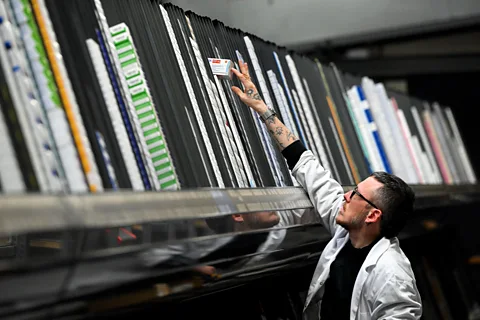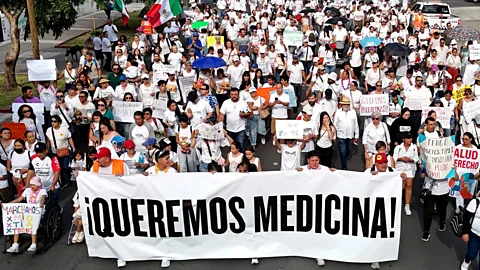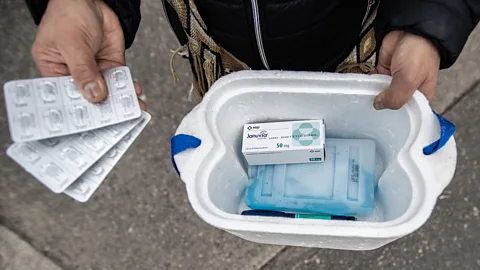'An urgent public health crisis': Why so many people are struggling to get medicine
 Getty Images
Getty ImagesPersistent shortages of popular drugs are affecting millions of patients worldwide. What lies behind it?
When the end of the month rolls around, Donia Youssef, a 46-year-old children's book writer based in Essex, UK, starts to worry. It is when she calls her local pharmacy to fill her prescription for ADHD medication, but increasingly she gets an answer she dreads: that the drug is out of stock.
"It has been an uphill battle trying to secure it," says Youssef, who has been taking Elvanse for her Attention Deficit Hyperactivity Disorder (ADHD) for six years. "This uncertainty is incredibly stressful and affects my ability to function daily."
Not only do straightforward tasks become daunting when Youssef doesn't have access to her medication, but the financial strain of potentially needing to pay out-of-pocket for alternative treatments, which are only sometimes covered by insurance, adds to her worries. "It's exhausting and disheartening," says Youssef.
Worldwide, hundreds of thousands of patients like Youssef are struggling to access their medication because of ongoing, unprecedented drug shortages around the world. Medications for ADHD, cancer treatments, statins, opioid painkillers, anaesthetics and antibiotics have had persistent or recurring shortages in recent years. Popular weight-loss drugs such as Mounjaro, Wegovy and Ozempic have experienced rapidly rising demand as their use has become popular alongside sudden increases in price, leaving many of those who need the drugs to manage conditions such as type 2 diabetes struggling.
In some cases, such shortages have proven lethal. In 2022, two-year-old Ava Grace Hodgkinson died of sepsis after a pharmacist couldn't amend a prescription for out-of-stock antibiotics. The case has led to policy discussions of how to better handle drug shortages in future.
Doctors and pharmaceutical experts have raised growing concerns about the shortages in recent months. The American Medical Association has reiterated its concern that drug shortages are an "urgent public health crisis" and a threat to national security.
But while government agencies, pharmaceutical companies and policy makers have been trying to find ways to tackle the factors behind the shortages, some speculate the scarcity will get worse, at least over the next couple of years, before it improves.
But for the patients who bear the brunt of these shortages, it means coping with worsening symptoms, finding other ways of managing their conditions, or taking less than they should to stretch their medication further. Others are paying over the odds or stockpiling drugs when they do become available.
 Getty Images
Getty ImagesThe number of drugs facing shortages has recently begun falling. As of the end of September 2025 there were 214 active drug shortages in the US, the lowest number since early 2018, according to data compiled by the American Society of Health-System Pharmacists (ASHP), an association representing 60,000 pharmacy professionals in the US. Shortages reached a peak in the first quarter of 2024 when the number reached a record high of 323. Yet many important medicines such as lorazepam, which is used to treat anxiety, and the steroid triamcinolone remain hard to come by, affecting "large numbers of patients", according to the ASHP. It says patients with chronic pain are also affected by shortages of oral opioids.
Elsewhere in the world there is a similar picture. In the UK, there were 135 drugs in short supply as of 20 October 2025. But a recent parliamentary report highlighted that medicine supplies were creating "severe" pressure in the health system and a separate report by MPs in July warned it had become a "chronic, structural challenge". It warned that these pressures are likely to escalate this winter. A survey conducted by British Generic Manufacturers Association (BGMA) in 2024 suggested that nearly half of all UK patients have struggled to get prescriptions while one in six went without their medicine altogether.
The Pharmaceutical Group of the European Union also noted that medicine shortages continued to affect all European countries. Nearly half of countries who responded to a survey reported having between 400 and 800 different medicines facing shortages between November 2024 and January 2025.
Solving these issues, however, is no easy task. That's because there's single reason for the drug shortages. Shifts in demand and the complexity of the pharmaceutical supply chain play a role, says Ilaria Passarani, secretary general of the PGEU. After the Covid-19 pandemic, many countries experienced surges in other respiratory diseases – and demand for medications to treat them, such as antibiotics, increased to. More than 40 countries have experienced at least one wave of infectious disease that's 10 times worse than before the pandemic.
Meanwhile, these shifts in demand are exacerbated by ageing populations, who are more likely to require medicines than their younger counterparts, says Passarani.
Cultural and social shifts can also drive changes in demand. In the UK, the 2021 documentary Davina McCall: Sex, Myths and the Menopause is thought to have led to a 30% surge in menopausal women requesting hormone replacement therapy drugs, contributing to a nationwide shortage.
Shortages of diabetes drugs semaglutide and tirzepatide – medicines commonly known as Wegovy, Ozempic, and Mounjaro – have similar origins. As they have gone from being diabetes drugs to being prescribed for weight loss more generally, the drugs have appealed to a larger pool of patients. This trend has been largely fueled by aggressive marketing strategies, such as partnerships with social media influencers and viral hashtags on Instagram and TikTok throughout the past two years. It has, according to some research, led to a perception of these drugs as being lifestyle enhancers rather than medical products. (Learn about what happens when you stop taking weight loss drugs in this article.)
Diabetes charities have recently warned of a global shortage of some glucagon-like peptide receptor agonists, known as GLP-1 drugs, due to a surge in prescriptions for weight loss. But earlier this year the US Food and Drug Administration (FDA) determined that supplies were sufficient to no longer allow compounding pharmacies to produce their own versions of these weight-loss drugs.
"It's truly just unprecedented demand driving the shortage," says Erin Fox, associate chief pharmacy officer at University of Utah Health, who has been tracking prescription drug shortages across the US for the past 20 years.
Still, it's unusual to see shortages of patented, brand-name pharmaceutical products because companies have a lot of monetary incentives to keep the supply chain running, says Fox.
The majority of shortages affect generic drugs – unbranded medicines containing the same chemicals as a branded drug whose patent has expired. These compete on the market according to their cost, not branding. This has led some to become so cheap – antibiotics plummeting to costs lower than a pack of chewing gum, says Fox – that they become loss-making products for manufacturers. As a result, many manufacturers quit making those drugs at all, leaving a gap in the supply chain.
This is what's happening to generic drugs, including ADHD medication, in the UK, says Mark Samuels, chief executive of the BGMA. "You've got complicated medicines that are expensive to manufacture, but the prices are very low," says Samuels. Pricing of generic medicines in the UK is the lowest in Europe, he says, meaning these medications are "taken for granted" by policymakers in charge of making sure drugs are available to their patients.
Since they're so cheap to sell, policymakers don't account for the costs of production and supply chain work needed for drugs to get to the patient, and they don't invest in the cost of building new manufacturing facilities. Yet generic medicines account for four out of every five prescription drugs used by patients in the UK, says Samuels. Around 91% of all prescriptions in the US are filled using generic drugs.
 Getty Images
Getty ImagesMeanwhile, countries including the US and UK face backlogs and delays with both supply, and inspections.
After having halted inspections of pharmaceutical production plants for the past five years, in part because of the pandemic, the US Food and Drug Administration (FDA) has been playing catch up. But in going through the backlog, they found an accumulation of quality problems in the years following the pandemic – sparking additional shutdowns.
"We're adding new shortages on top of shortages that aren't resolving," Fox says.
Cost-cutting measures by the Department of Government Efficiency (DOGE) may have made the situation worse, Fox adds. "We know inspections were already behind and the uncertainties may make it harder to hire staff."
Trade tariffs – particularly on China – have placed further strain on the supply chain. More than 92% of the facilities manufacturing generic pharmaceuticals for the US market are on foreign soil. Much of the global supply of active ingredients for medications come from China.
"If a company can't sustain the added costs of tariffs on the raw materials or other ingredients or packaging, then they may simply choose to just discontinue the product," Fox says, who notes this will likely not be "immediately, but more in the six to twelve months after tariffs are implemented".
In the UK, similarly to the FDA, the Medicines and Healthcare products Regulatory Agency (MHRA) has been experiencing delays, taking between 24 and 30 months to issue licenses to generic manufacturers for producing new drugs. This makes it harder for companies to jump in and cover shortages when another company might be experiencing a normal, run-of-the-mill manufacturing challenge, says Samuels.
Brexit also has contributed to the shortages by removing the UK from EU supply chains and lowering the value of sterling, according to think-tank The Nuffield Trust, which calls the skyrocketing shortages the "new normal".
These shortages affect patients like Youssef daily, but they also undermine the relationship between patients and pharmacists.
"Every pharmacist is having to deal with this and that's why we are asking patients to be patient with us," says Thorrun Govind, a pharmacist from Manchester, UK. "We are spending hours each week to source the medicines they need."
In August 2025, the UK government published plans to reduce the shortage of medicines by identifying potential disruption to supplies earlier and measures including reactivating dormant drug licenses and investing in domestic manufacturing.
A few months earlier, the US Government Accountability Office recommended that the Department of Health and Human Services implement formal mechanisms to coordinate drug shortage activities across federal government.
More like this:
More broadly, experts suggest it should be mandatory for all pharmaceutical companies to have shortage prevention and mitigation plans, and for the pharmaceutical company's ability to supply medicine to be one of the factors they are graded against within the market. "We need a better way for products to compete besides price alone, a different rating system about the quality of those manufacturers," says Fox. "The ability to supply it has to be a part of that quality. Can we rate medicines that way?"
For its part, the pharmaceutical industry says it is working closely with authorities like the FDA to prevent shortages of prescription drugs.
But while experts and policymakers work together to create more resilient pharmaceutical supply chains to avoid further shortages in the future, Fox says it's also important for patients not to panic.
"Just because you hear about a shortage doesn't mean that that drug is 100% gone," says Fox. "That's almost never the case." Patients might have to have a different dosage or have to wait a couple of days, and there will be some frustrating time in between.
"But I definitely don't want patients to panic that there's zero product and they'll 100% have to go without treatment."
--
For trusted insights into better health and wellbeing rooted in science, sign up to the Health Fix newsletter, while The Essential List delivers a handpicked selection of features and insights.
For more science, technology, environment and health stories from the BBC, follow us on Facebook and Instagram.
